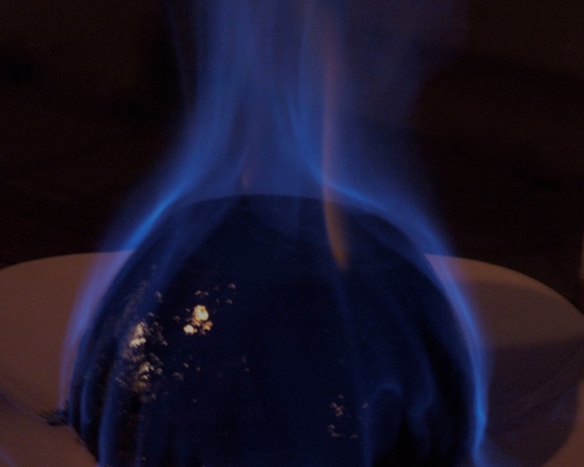The attack of the Christmas cards has begun, and if we don’t deliver ours quickly we’ll have to leave the village. Come December, forget conversation, companionship, helpful acts, even love: Cards are the only measure of friendship. If we don’t give someone a card, they’ll think we don’t like them. Or that we’re such socially awkward clods, we’re not worth liking.
Actually, I’m making that up. I don’t know the thinking behind it is, although I do understand that Christmas cards are more important here than on any other part of the planet. Everyone gives them to everyone, and you have to do it. For all I know, everyone hates it but is as intimidated as we are. The entire country is running around buying and delivering cards only because they’re afraid other people will think they’re either awkward clods or hostile.
Whatever lies behind it, though, we’ve stocked up.

Season’s greetings, y’all. Photo by Ida Swearingen
Where we live, people sneak up to the door and push them through the letter slot. We don’t see the people, just the cards. We’ll be sitting around, our minds so sublimely at peace that we’re levitating inches above the floor, and flap, a card drops through the slot. We flop painfully onto the floor and pick ourselves up to collect the card, but by the time we open the door no one’s out there. Except for the signatures, which we recognize, they might as well be messages from the fairies.
People have a saying here: “Oh, she (or he) is away with the fairies.” (It always seems to start with “Oh.” Maybe that makes is wispier, more away-with-the-fairies-ish.) A number of people Wild Thing and I know could be, and have been, described that way, and maybe they’ve sent these back from wherever the fairies live. The fairies have a delivery service. That’s very thoughtful. But it only works at this time of year.
Okay, a few people deliver their cards in person. They stop in and have a cup of tea. Or they bring them to meetings and hand them around. If you belong to a club or go to any regular activity, people will show up in December armed with cards and pass them out. Most people write name on the envelopes, which means they have to flip through them, once, twice, fourteen times, to find the right one. Some bring a few spares with no names in case they’ve forgotten anyone, or someone they didn’t expect shows up. It’s an odd mix of touching and impersonal when you get one of these.
It made us feel like awkward clods when we didn’t come with a stack of our own, so we’ve started bringing some (nameless, because we’re not well enough organized to predict who’ll be there). But bringing them makes me—although not Wild Thing—feel like a hypocrite. Not because I don’t normally send Christmas cards, but because handing them out this way strikes me as deeply weird.
I’m not going to try to justify that. It’s just one of those deep cultural weird things.
But I can’t talk about Christmas cards without talking about deep cultural weird things, so here we go: I grew up celebrating Christmas, but in a family of non-religious Jews. The kind of Jews who celebrated a non-religious Christmas. Our Christmas cards always said “Season’s Greetings.” I think that was to accommodate other people’s beliefs rather our own. I mean, we did celebrate Christmas, so I can’t see where saying “Merry Christmas” would be insensitive to our beliefs, but somehow I was left with the odd feeling that it would be. Were we such tender souls that we had to be careful not to insult ourselves? Not by a long shot, but don’t expect this to make sense entirely.
When I was old enough to send my own cards, I searched through box after box, reading the little tag on the back that said, if I was lucky, “Greeting: Happy Holidays.” Or “Season’s Greetings.” I’d settle for either one, although I like the second better. That search was a part of who I was. But it also made practical sense. My—and later our—friends included Christians, Jews, and atheists, and as time when on Buddhists, Muslims, some self-described pagans (no, don’t ask me what it means; my understanding of the word is that it’s what Christians called earlier religions, not what those religions called themselves, but if someone wants to call themselves that, it’s not up to me to call them something else), and some people I’ve left out because I’m not sure what they are. I’ve spent a good part of my life learning not to make assumptions and the learning’s never complete, but I don’t want to summarize where I’m not sure.
So Season’s Greetings it was, even though we all know a Season’s Greetings card is nothing but a disguised Christmas card. A more inclusive one, but still a Christmas card.
And then I moved to the U.K. Where I live now, way out in the country, I’m the only Jew of any description for miles around. I don’t know of any Muslims or Buddhists in the immediate area, and the pagans at least used to celebrate Christmas, whether they do anymore or not. Like the many people around here who aren’t religious, they come from Christian backgrounds, even if you have to go back several generations to find anyone who treated that as a religion. So Season’s Greetings cards are hard to find. And largely irrelevant, since after our first year here, when we sent cards to friends in the states and discovered that the postage cost a small fortune, we give them mostly to friends in the village. In other words, everybody we’re giving cards to celebrates Christmas—some with a religious bent and some without, but Christmas all the same. None of them, I’m sure, celebrates it with the complications that I bring.
And guess what? I still want my cards to say “Season’s Greetings.” It’s like my accent: It’s a part of who I am. I’m a Season’s Greetings kind of person, living in a Merry Christmas kind of place. (I have no idea why I’m capitalizing that except that it’s capitalized on cards, so it becomes a habit. This is what happens to copy editors when they retire: They do all kinds of inconsistent things, and they notice, and wince, and in my case leave some of them uncorrected. And find a perverse joy in that.)
Actually, people here say “Happy Christmas,” not “Merry Christmas.” But that’s a different complication.
Over the years, Wild Thing has alternated between impatience and understanding when I turned over box after box of cards to read the greetings printed on the back. Then she took up photography and we started making our own cards. They can say whatever we want.
Problem solved.
But we still have to sneak up on our friends and neighbors and shove the cards through their letter slots. Otherwise they’ll think we don’t like them.
Or something. I don’t know what they’ll think, but I do know we don’t want them thinking it.
So whatever you celebrate, Season’s Greetings.



